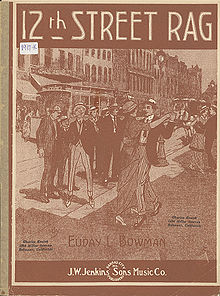Twelfth Street Rag
This article needs additional citations for verification. (September 2016) |
| "12th Street Rag" | |
|---|---|
 Original sheet music published in 1915 | |
| Composition by Euday Bowman | |
| Written | 1898 |
| Published | January 30, 1914 |
| Genre | Ragtime |
| Songwriter(s) | Euday Bowman |
Instrument: Piano, solo (in original form) | |
"Twelfth Street Rag" (alternatively "12th Street Rag") is a ragtime musical composition published by Euday L. Bowman in 1914.[1]
Background
[edit]A friend of Euday Bowman known as "Raggedy Ed" declared his intention to open a pawn shop on 12th Street in Kansas City while the two were walking along it. Bowman is rumored to have said "If you get rich on those three balls, I'll write a piece on three notes to make myself rich."[2][3]
It was more than 15 years after Bowman composed the song before he actually wrote the music down in manuscript form. He returned to Texas briefly and tried to sell the piece to a company in Dallas; but he only had an offer of ten dollars for it and was told it really was not worth publishing. Returning to Kansas City, he sold it to Jenkins Music Company in 1913. The Jenkins company felt Bowman's arrangement was far too difficult however, hiring C. E. Wheeler to simplify it.[4] With a big advertising push "12th Street Rag" began to sell better. In 1919, James S. Sumner added lyrics. The song was popular with early Kansas City bands and became a hit after Bennie Moten recorded it for RCA Victor in 1927, the same year Louis Armstrong and His Hot Seven recorded it.
Composition
[edit]The piece was written in E-flat major[5] and follows an AABA form.[1]
Other recordings
[edit]Euday Bowman, the composer, recorded and published his own recording of the piece, on Bowman 11748. Louis Armstrong and His Hot Seven recorded the song for Okeh Records in Chicago in May 1927. Krazy Kat and his orchestra perform the music in the 1930 cartoon The Bandmaster. A recording by Pee Wee Hunt[6] was the Billboard number-one single for 1948, selling more than three million copies. It was released as Capitol Records 15105 in May 1948. Donald Peers recorded the song in London on March 26, 1949. It was released by EMI on the His Master's Voice label as catalogue number B 9763. Other notable performers of the song include Roy Clark, Barney Kessel, and Jack Teagarden.
Popular culture
[edit]The song is perhaps best known in the US and UK as the theme to The Joe Franklin Show;[7] the version most associated with the program was Big Tiny Little's 1959 recording from his album Honky Tonk Piano (Brunswick BL (7)54049).
A brief excerpt of the song can also be heard about 37 minutes into the 1996 film The English Patient.[citation needed]
The song is sampled in two "Weird Al" Yankovic polka medleys: "Hooked on Polkas" and "Polka Power!".[citation needed]
The melody of the song is heard in the Chuck E. Cheese 1999 film Chuck E. Cheese in the Galaxy 5000, serving as the basis for the song, "The Galaxy's For You and Me". The same melody is played during the first scene in the soda shop.[citation needed]
Since 1999, a steel guitar version has been featured as background music on the US television cartoon series by Nickelodeon, SpongeBob SquarePants.[8]
The Rastrelli Cello Quartet recorded a version for four cellos in 2006, on the album Vol. 1 - Concerto Grosso A LA Russe.[citation needed]
In 2006, a Huell Howser episode of California's Gold began by Huell asking Fotoplayer operator Joe Rinaudo to "hit it Joe", following which Joe launched into a rendition of "Twelfth Street Rag".[9]
See also
[edit]References
[edit]Citations
[edit]- ^ a b Jasen & Tichenor 1989, p. 50.
- ^ Laird, Landon (June 5, 1949). "About Town". The Kansas City Star.
- ^ Driggs & Haddix 2005, pp. 32–33.
- ^ Driggs & Haddix 2005, pp. 33.
- ^ Bowman 1915, p. 2.
- ^ Gilliland, John. (197X). "Pop Chronicles 1940s Program #20 - All Tracks UNT Digital Library". Digital.library.unt.edu. Retrieved February 6, 2021.
- ^ "Inside CBS: Turnover and Takeover Talk". New York Magazine. November 4, 1985. p. 30. Retrieved July 23, 2022.
- ^ Bien-Kahn, Joseph (May 22, 2022). "#1 pop song from the year you graduated high school". KALB-TV. Retrieved July 23, 2022.
- ^ "Fotoplayer – California's Gold (8007) – Huell Howser Archives at Chapman University". Huell Howser Archives. Chapman University. January 9, 2006. Archived from the original on September 7, 2024. Retrieved January 10, 2025.
Sources
[edit]- Bowman, Euday L. (1915). 12th Street Rag. Forth Worth, TX: Euday L. Bowman. LCCN 2023864174. Retrieved January 10, 2025 – via Library of Congress.
- Bowman, Euday L. (1919). 12th Street Rag. Arranged by C. E. Wheeler. Kansas City, MO: J.W. Jenkin's Sons Music Co. – via Johns Hopkins University.
- Driggs, Frank; Haddix, Chuck (2005). Kansas City Jazz: From Ragtime to Bebop: A History. Oxford; New York: Oxford University Press. pp. 15, 32–33, 164, 197. ISBN 978-0-19-504767-7.
- Jasen, David A.; Tichenor, Trebor Jay (1989). Rags and Ragtime. New York: Courier Corporation. pp. 50–51, 137–138, 262. ISBN 978-0-486-25922-2.
External links
[edit]- 12th St Rag: Scores at the International Music Score Library Project
